Are we creating Trauma for ourselves? (Patreon)
Downloads
Content
Alfred Adler claimed that “we do not suffer from the shock of our experiences -- the so-called trauma -- but we make out of them just what suits our purposes.” For Adler, trauma doesn’t exist. Though, perhaps he means ‘trauma doesn’t have to exist.’
<figure>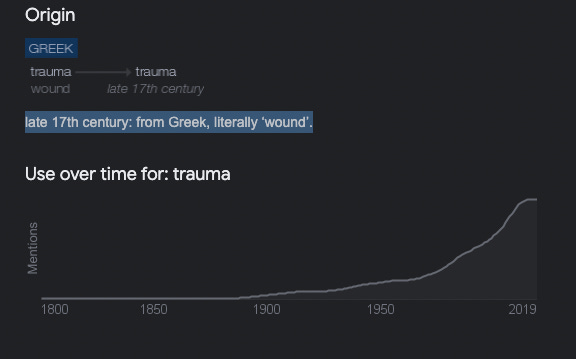 </figure><figure>
</figure><figure>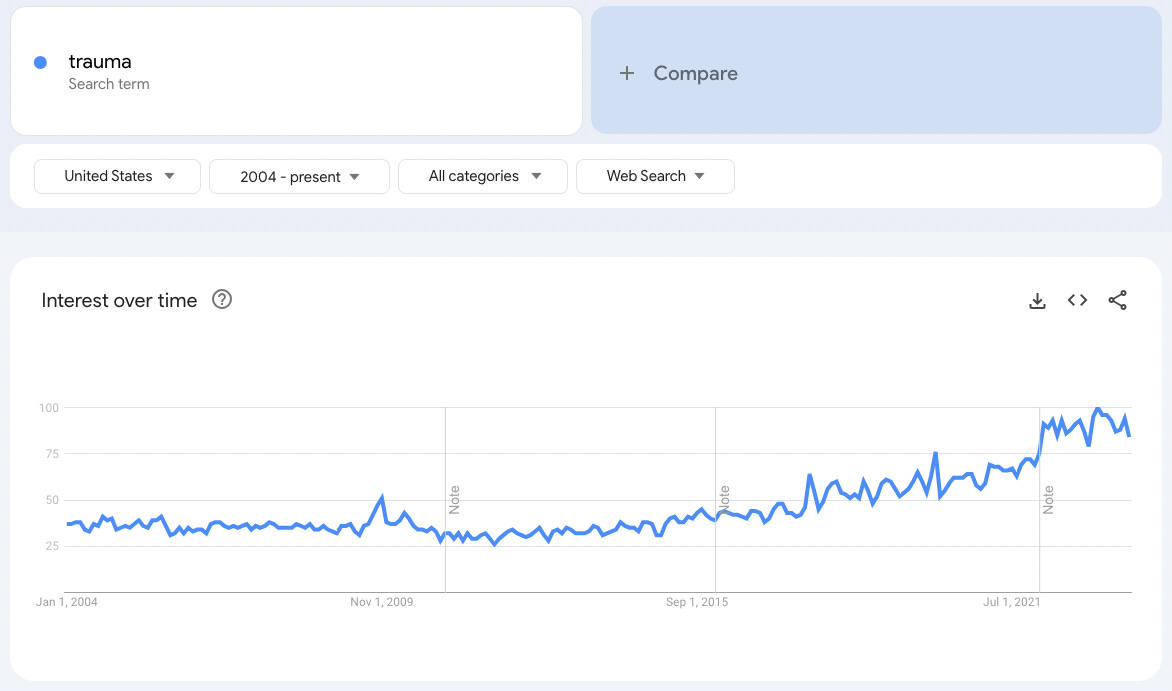 </figure>
</figure>According to Google, interest in the term “trauma” has steadily grown, and began to really take off alongside interest in the term “therapy.”
<figure>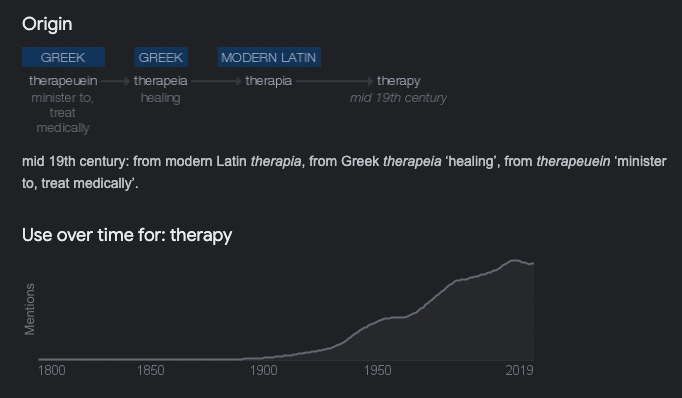 </figure><figure>
</figure><figure> </figure>
</figure>Trauma addresses more and more things nowadays - it’s no longer just for war veterans or survivors of violent attacks. Some people nowadays are trying to lower the bar for what constitutes a psychic wound as much as possible and loudly demand ‘trigger warnings’ and ‘safe spaces.’ Others only suspect something in their past might be holding back and are not sure whether that constitutes ‘trauma’ or not. Others are simply on a quest to better themselves and never thought that they might have trauma until a therapist suggested it.
Dr. Alok Kanojia of the very popular HealthyGamerGG channel says that as many as 60% of people in the world have adverse childhood experiences that could be almost classified as traumatic. (60%? Wow! Maybe I have trauma?!) Sounds like the bar for what constitutes trauma is pretty low. You can find plenty of well-viewed videos like this one of Patrick Teahan’s that suggest that your problems today are a result of childhood trauma.
<figure>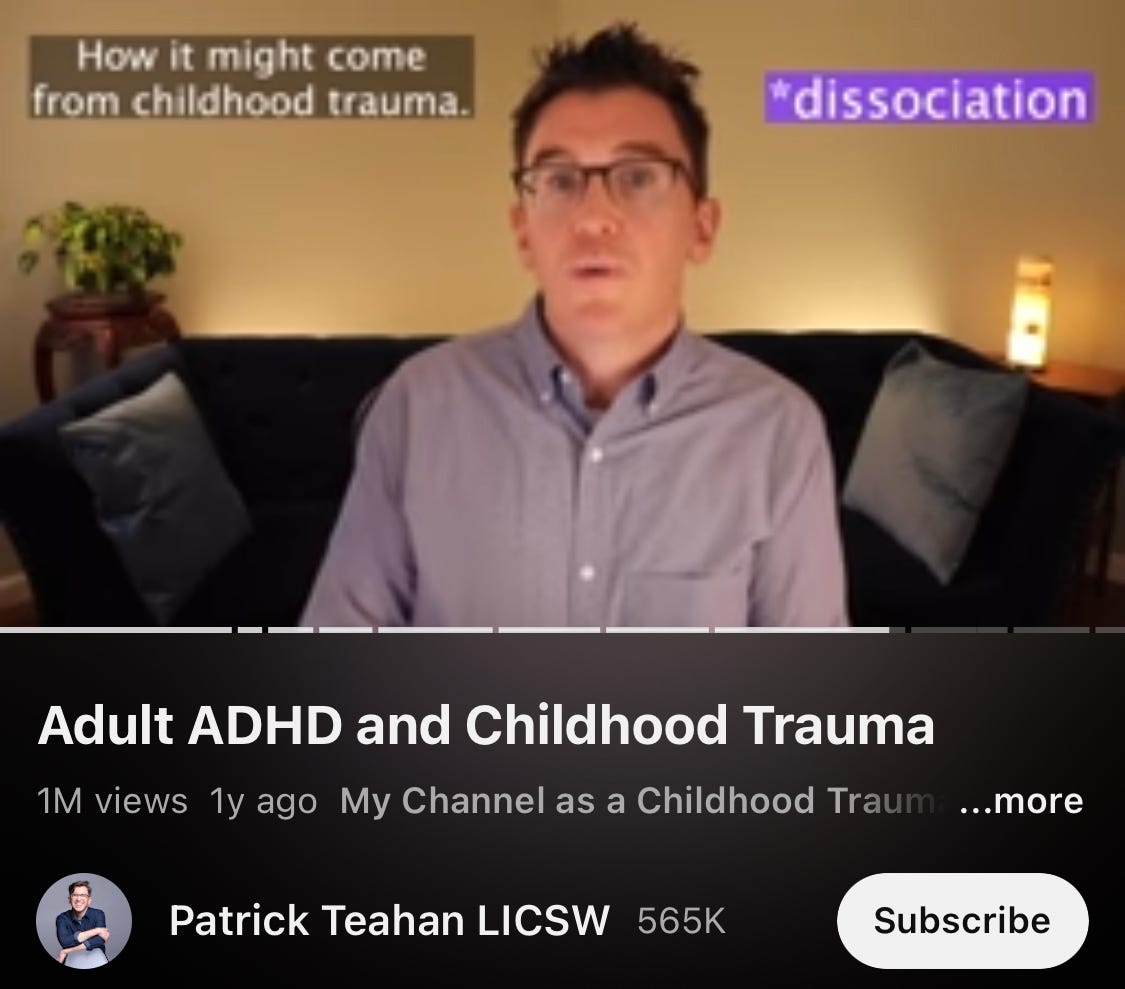 </figure>
</figure>Teahan says that his patient suffering from ADHD’s “story” is more important than their “symptoms.” He talks about how the patient’s “inner child” is at fault for sabotaging their attempts to succeed in life. He brings up a hypothetical situation where a client is late to a Zoom call and their mind is very scattered while sitting on that Zoom call. He says:
“if a client me told about such a zoom call, we would be working with how all of that is related to childhood trauma beliefs.”
He explains that the patient may be very anxious and unfocused during the Zoom call and they are unconscious of the fact that this all stems from childhood trauma. Two questions came to mind when watching this:
- How does Patrick Teahan know? If the past trauma is unconsciously having an influence on the person now, how can you confirm that… if that person cannot be conscious of that influence?
- Is it helpful to encourage people to ponder how their problems today could be the result being a victim of childhood trauma?
What even is trauma?
Psychiatrist Bessel van der Kolk, author of The Body Keeps the Score says that:
“Trauma is actually extremely common. There’s a lot of debate about what a trauma is to this day. But, basically trauma is something that happens to you that makes you so upset that it overwhelms you.”<figure>
 </figure>
</figure>Dr. K of HealthyGamerGG says that:
“Trauma manifests as so many problems … trauma is a whole brain or whole person effect. You can’t slice it up into one piece because trauma sort of affects every aspect of who we are, how our brain functions, how we form relationships.”
He says that “trauma is the great chameleon of mental illness,” that trauma can masquerade as anything from lack of motivation to impulsivity to being a people pleaser to depression or to addictions. Some Instagram posts seem to be capitalizing on this ‘potentially anything could be the result of trauma.’
<figure> </figure>
</figure>Per The Behavior Disorders of Childhood (1970) an adverse experience such as the childhood loss of a parent "has been put forward as a monocausal hypothesis to account, in part or whole, for adult depression, schizophrenia, personality disorder, neurosis, and occupational maladjustment"
In Didier Fassin and Richard Rechtman’s book The Empire of Trauma: an inquiry into the condition of Victimhood, they note that the concept of ‘trauma’ started to enter the zeitgeist as people were trying to make sense of the victims of shell shock. They point out in the book that nowadays, “the idea that tragic and painful events, whether individually or collectively experienced, leave marks in the mind which are then seen as ‘scars’” is commonly accepted. Just a few decades ago, “trauma was rarely evoked outside of the closed circles of psychiatry and psychology,” and before that, soldiers experiencing PTSD were met with skepticism and contempt. Nowadays, the psychic suffering of injured workers and soldiers is “no longer contested [and] … excites sympathy and merits [financial] compensation.”
“Over the last 25 years, trauma has become established as a unique way of appropriating the traces of history and one of the dominant modes of representing our relationship with the past. … in the United States the concept of “cultural trauma” has been applied to slavery, the Holocaust, and 9/11, all of which are seen as wounds in the collective memory…” -The Empire of Trauma
The interesting thing about this is that whether a given experience will become psychological trauma depends on the person.
<figure>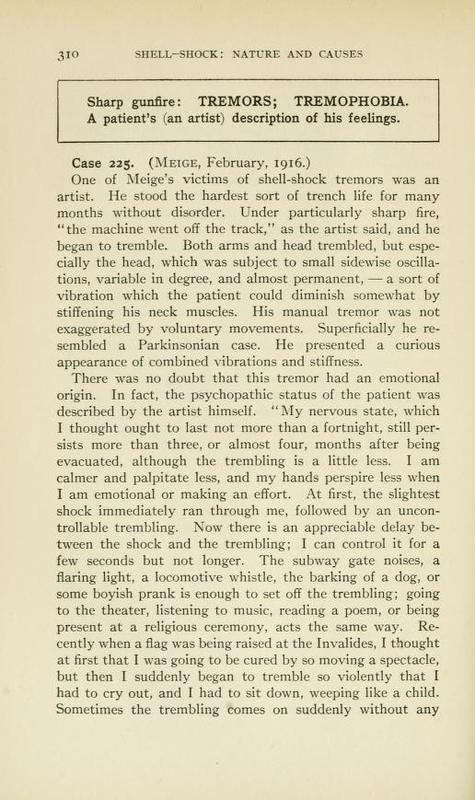 </figure>
</figure>“One of these soldiers is unable to speak. In tears, he writes: I killed a German. Took him out with the butt of my rifle. He was a nice little kid with loved ones back home. I’ll tell my fiancee I’m a murderer and yet, I’ve always rejected violence.” -Shell Shock, National Geographic<figure>
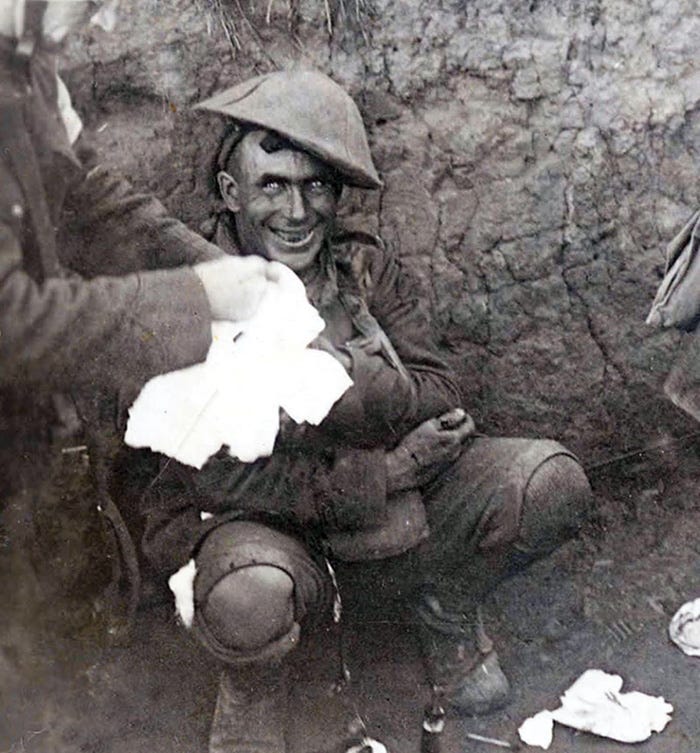 </figure><figure>
</figure><figure>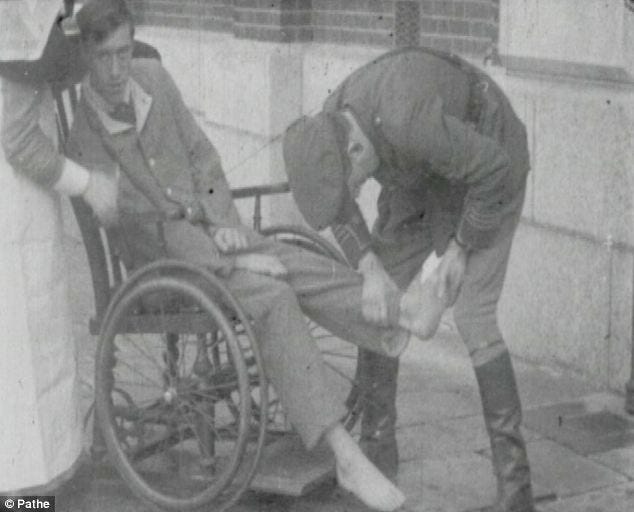 </figure>
</figure>Recent research has suggested that Shell Shock was in fact actual brain damage (TBI) from exposure to blast force on the battlefield from explosives.
<figure>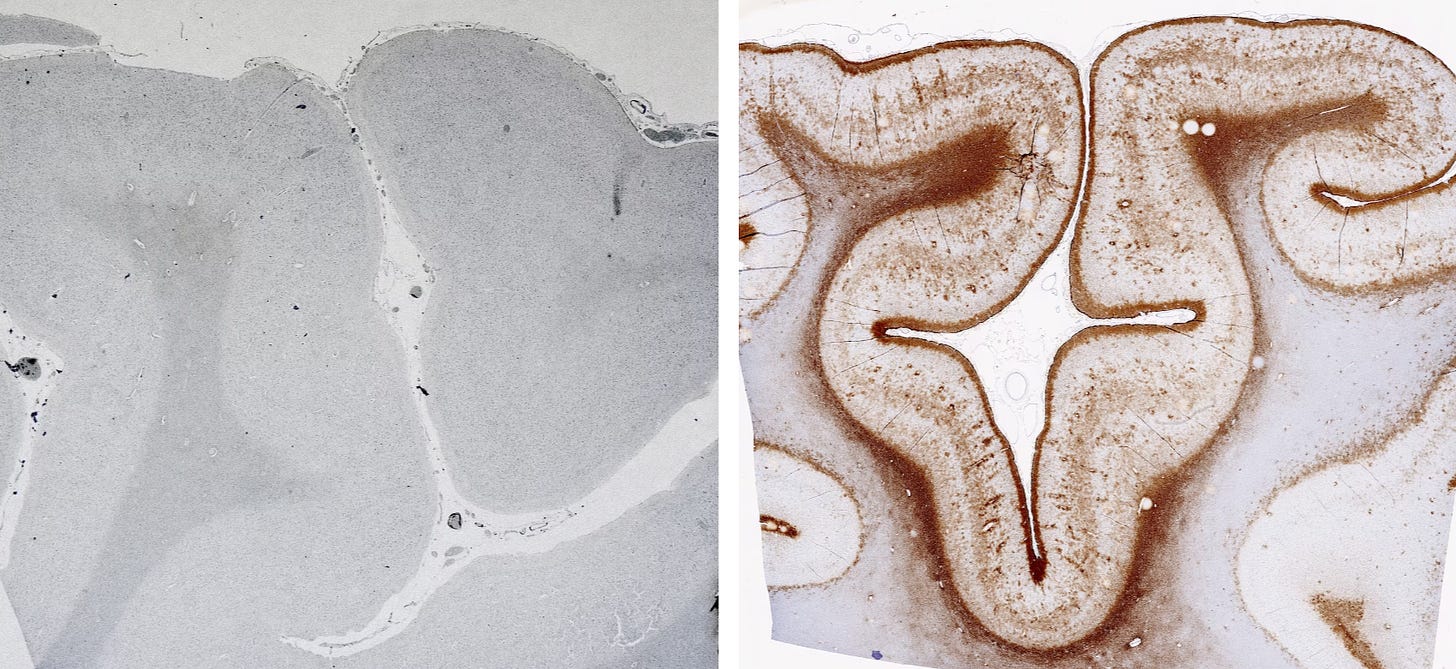 </figure>
</figure>In Effeminacy, Ethnicity and the End of Trauma: The Sufferings of ‘Shell-shocked’ Men in Great Britain and Ireland, 1914–39, they explain that where some men suffered crippling shell shock, others absolutely delighted in unleashing their aggression to kill enemy soldiers.
Victor Frankl’s book Man’s Search for Meaning discusses his time spent in four different concentration camps. He highlighted various mens’ responses to the horrendous, hopeless nature of the camps. He explains that not all men had to suffer the same fate in response to their circumstances; the right mentality could drastically improve a man’s prospects for survival.
What’s curious is that it’s hard to predict whether a given circumstance will become ‘trauma,’ but trauma as a term is so vague that a wide range of experiences, violent or not, can become trauma depending on how someone interprets the experience (or perhaps how others interpret it for them). Apparently trauma isn’t just the result of grave situations like helplessly facing death in a war or a concentration camp, but also (according to Instagram) having an emotionally distant father.
Are people being convinced that they have trauma?
<figure> </figure>
</figure>(Wow, I thought the reason for my procrastination was that I just enjoyed playing Smash Brothers more than scouring the internet for the source of a claim I made but forgot to hyperlink. I didn’t know it was actually my Dad’s fault!)
Some people have indeed gone through incredibly difficult childhoods that have generated very unhelpful behavior patterns that are hard to reshape. Though, I can’t help but wonder if adverts like this one on Instagram may incline people to invest too much effort into pondering how they could have been a victim as a child … and how that is the source of their troubles, rather focusing on practical solutions that would be effective now.
Nowadays, suggesting that someone ‘get therapy’ is akin to saying ‘eat a healthy diet!’ There are tons of different types of therapy and the effectiveness of each will vary from person to person, and others have alleged that certain types of therapies can actually be harmful. So, I’m basically picking a name out of a hat here but let’s take a look at one video from HealthyGamerGG.
<figure> </figure>
</figure>I’ve watched HealthyGamerGG in the past and Dr. K seemed to provide quality information on ADHD. The comments in his videos seem to usually be overwhelmingly positive and many people have gushed about how the channel has been life-changing for them. So, my goal isn’t to criticize the channel as being unhelpful. However, I couldn’t help but notice in his interview with William, who suffers from C-PTSD due to an awful childhood, Dr. K reinforced multiple times to William the effect that trauma should have on his life.
(Note: I’m straight up extracting just these instances of Dr. K reinforcing the trauma, they likely don’t sound as bad when you consider the entire context of the conversation. I’m not saying the conversation wasn’t helpful to William on the whole. In fact, the conversation seemed to end with William being more hopeful about his situation - I am just taking note of these instances of ‘affirming’ of the trauma.)
William explained how as an 8-year-old boy he would be constantly berated by his mother about how useless he was for about an hour every day. He talked about how he’s considered suicide. Here are some of the things Dr. K said:
30:00 - "Sounds like you've been through... like... you've just had a really shitty life."
32:39 - “Yea so I’m actually a little bit surprised that you’re still alive.”
I understand that Dr. K is trying to be real and empathize with William. Therapy may be more enjoyable when the client feels the therapist understands them. (Though, I should note at this point that in a paper criticizing psychoanalysis, Dr. Albert Ellis says that a patient achieving the feeling that their analyst likes them may make them “feel better,” it is not necessarily part of the path to them “getting better.”)
In any case, is it really helpful to imply to the client that it is the default for such a past to drive someone to suicide? What if he talked instead about how countless people have demonstrated the remarkable ability to not let even the worst hardships hold them back in life, and that William 100% has that same ability, regardless of how bad his past was?
35:57 - “And also, I want you to hope and I hope that I can help you hope a little bit. And if I can’t, that’s OK too because I don’t think it’s my place to believe that I can get you to hope.”
39:11 - “The reasons to kill yourself are like …let’s give it a score of 1000.”
42:10 - “Can you be fully healed? Yea. I think so. Although, maybe not. [thinks for a moment] … I think you can be healed enough to where you no longer want to die and you will cling onto life.”
As psychologist Scott Lilienfeld has explained, it’s thought that because depression is a disorder of demoralization, many interventions for depression work simply because they instill hope in a patient. Depression is generally associated with a demolishing of hope for the future. Getting depressed people in goal-oriented cognitive state is an important step forward.
This paper explains that social support is a big part of ameliorating depression. The community Dr. K has built along with his willingness to interact directly with the members is probably fantastic for them. One study of psychoanalysis, half the patients improved but simply the emotional support of the therapist was most associated with improvement.(S)
However, what is the utility of implying to someone that their trauma is so bad that it’s expected for them to have no hope and that they have plenty of reason to want to kill themselves … oh and by the way their case is so bad that a medical professional doesn’t even know for sure if they can ever be fully healed.
I think this is especially important to consider in light of the fact that the mind and body are very susceptible to suggestion. For years scientist scratched their head at the ‘power of suggestion,’ otherwise known as the placebo effect. There is also a nocebo effect, where expecting negative outcomes can be a self-fulfilling prophecy.
From The nocebo effect and its relevance for clinical practice
Negative expectations deriving from the clinical encounter can produce negative outcomes, known as nocebo effects. … information disclosure about potential side effects can itself contribute to producing adverse effects. … The nocebo response is influenced by the content and the way information is presented to patients... Nocebo effect adversely influences quality of life and therapy adherence, emphasizing the need for minimizing these responses to the extent possible.
For the record while Dr. K basically affirmed Williams trauma, he later in the conversation did talk about identifying his specific areas he could work on to improve his life.
Of course many of our behavior patterns in the present are likely the result of our past experiences. We also understand that big events, particularly shocking or scary events can have a bigger effect on the person’s character or behavior patterns. Though, the question is: what do we do now?
Unfortunately, a good chunk of the focus has gone to what are the hidden causes of our behavior, thanks to Sigmund Freud.
How a cocaine addiction influenced our conception of how the mind works
‘There’s probably some painful memory you can’t access because your mind is repressing it. You better shell out some dough to a psychoanalyst because you can’t figure that out for yourself, only psychoanalysts knows the way to get your mind to unlock that memory. By the way, you’ll be going to a psychoanalyst for a long time because who knows how much is hidden in your subconscious. If you don’t express those hidden emotions, they might come forth later in uglier ways, like Tony Soprano who suddenly had a panic attack when ducks flew away from his pool.’
<figure> </figure>
</figure>Something like this is a part of the Zeitgeist thanks to Sigmund Freud. In an episode of The Simpsons, Marge visits a therapist to try and identify the cause of her fear of flying so that it may be cured. Marge recalls a time during her childhood when she was horrified to see that her father was a stewardess rather than a pilot.
<figure> </figure>
</figure>Therapist: “We’ve pinpointed the precise moment when you developed your fear of flying.”<figure>
Marge: “Wait, some other stuff’s coming back to me.”
 </figure>
</figure>Marge then recalls other traumatic childhood memories. Her grandmother with poor hand-eye coordination smacking her in the face repeatedly with a spoon of baby food while saying “here comes the airplane.” Her riding a toy airplane and it catching fire. Her looking at a corn field with her mother and a biplane flying by and shooting at them.
<figure> </figure>
</figure>Therapist: “You know Marge, we’ve really just begun to scratch the surface. There’s still the far more serious problem of your husband.”
Homer: “That’s OK, you don’t need to make her into some kind of superwoman. She can get on the plane, that’s plenty.”
Talk therapy technically started with Sigmund Freud’s friend Joseph Breuer, but Freud receives most of the credit for ‘inventing’ it.(S) Freud was basically a cocaine-addicted, sex-obsessed weirdo who assumed everyone wanted to have sex with their mother because he did.
Frederick Crews explains in his book Freud: The Making of an Illusion that Freud said himself that his assumptions about how the average person’s psyche develops was based on his investigation into his own psyche. Further, he would make conclusions about the nature of his psyche based on the content of his incredibly vivid cocaine-fueled dreams. He would take cocaine, go to sleep, have dreams and then write down the content of the dreams (and assume that these dreams were about his childhood). This process is what lead him to thinking that boys aged three to six sexually lust after their mothers and fear their fathers will castrate them as punishment.
By tracing the associative relationship between cocaine and his infantile memories, Freud would arrive at the Oedipal conflict. -Freud’s Cocaine Dreams and Memories
Freud claimed that he could remember an incident when he was three years old, saw his 23-year-old mother nude, became sexually aroused by this, and then his father took his mother elsewhere out of Freud’s sight and Freud felt jealous and angry at his father. Freud admitted in a letter to his friend Wilhelm Fliess that “I have found, in my own case too, [the phenomenon of] being in love with my mother and jealous of my father, and I now consider it a universal event in early childhood.” So he basically universally ‘projected’ his incestuous desires onto the average person.
Considering that memory is well understood to be fickle and malleable, it’s incredibly doubtful that Freud actually remembered how the incident with his mother made his three year old self feel. What is much more likely is that Freud arbitrarily decided that this incident was what sparked his abnormal incestual desire for his mother and it happened to fit into his ideas about the “phallic stage” which he claimed occurs from ages three to six.
Again, Freud’s psychoanalysis process was based on what was going on in his own psyche. His friend Wilhelm Fleiss said that “the reader of thoughts merely reads his own thoughts into other people.” Freud would push his theories onto his patients and when the patients resisted, as they often did (“Are you nuts? I never wanted to have sex with my mother!”), Freud assumed that this resistance was evidence that Freud was right.
The Freudian concept of “resistance” refers to the repressing of unconscious drives so they are not integrated into conscious awareness. That is, you’re too scared to allow what’s lurking in the unconscious to bubble up into the conscious awareness, so you resist. Freud was so confident in his cocaine-fueled insights that he figured only someone who wanted to have sex with their mother would adamantly resist the idea that they wanted to have sex with their mother. Heads Freud wins, tails the patient loses.
Freud reportedly falsified case reports to show positive outcomes for his patients. Freud revealed to his buddy Fleiss that while he claimed publicly that he had cured 18 people of hysteria, he acknowledged privately in his letters that in fact none of them had been cured. His own patients said he was an ineffective therapist.
Aames highlights the case of one of Freud’s most famous patients, the “Wolf Man,” Serge Pankejeff. At age 4, Serge developed an obsessive fear of wolves after several visited him in a dream. Because Freud of course thought everything was about sex, he deduced that the Serge must have developed this phobia as a result of being traumatized by having seen his parents having sex. It did not matter to Freud that the patient denied having ever seen his parents having sex. Freud believed the wolves in Serge’s dreams lacking tails meant Serge was afraid of being castrated.
After four years of providing six hours of therapy a week, Freud declared that he had cured this patient of his phobias and compulsions.
“Wolf Man wasn’t cured of anything except his money - the Russian aristocrat paid Freud the equivalent of 500,000 euros in today’s value.”
A reporter tracked down Serge Pankejeff who went to various other psychoanalysts for decades without his issues ever being resolved. He said himself that the entire thing was a catastrophe: “I am in the same state as when I came to Freud.”
Much of Freud’s ideas never held any water.
Per Dylan Aames Lies Your Psychologist Told you:
There is little or no empirical evidence for each of the following claims Freud made about the psychosexual stages:
・”Oral” or “anal” characteristics of either neediness or stinginess are the result of problems stemming from toilet training or the weaning phase.
・Women are less morally developed than men.
・Women suffer from “penis envy.”
・Boys between the ages of three and six desire their mothers sexually and fear their fathers will castrate them as punishment.
・Homosexuality stems from arrested development.
・Children go through psychosexual stages (e.g. oral, anal, phallic).
・Childhood trauma, including sexual and physical abuse, typically leads to severe psychological disturbances in adulthood
One of the biggest hits to the credibility of Freud’s ideas is that, as psychologist Scott Lilienfeld explains
…there’s no compelling evidence that all or even most adult psychological problems stem from childhood difficulties (Paris, 2000) and… there’s considerable evidence that insight isn’t always needed to achieve enduring personal change.
That is, people can address their psychological or behavioral problems without learning exactly why they developed.
According to a 1996 paper in Psychological Science:
“There is literally nothing to be said, scientifically or therapeutically, to the advantage of the entire Freudian system or any of its component dogmas.”<figure>
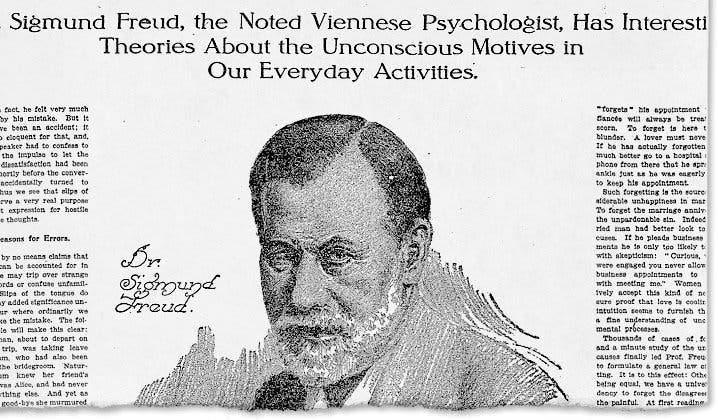 </figure>
</figure>Have you ever considered you’re screwed up but just don’t know it?
"Unexpressed emotions will never die. They are buried alive and will come forth later in uglier ways."“Out of your vulnerabilities will come your strength.”
-Sigmund Freud
Freud viewed the unconscious as “a repository for socially unacceptable ideas, anxiety-producing wishes or desires, traumatic memories, and painful emotions put out of mind by the mechanism of repression.” That is, there’s tons of potentially pathological shit going on in your head that you don’t know about.
I think this is one of the more nefarious of Freud’s ideas: That you probably have various traumatic memories that affect you to this day, but those memories are repressed. According to Freud a memory can be repressed and still affect your behavior, but by definition, you cannot be aware of its existence. That is, everyone of us is a suspect for having painful emotions that are being repressed by our minds and could be the root of all our problems.
Yet… as Dylan Aames explains:
“There’s no evidence nor reason to believe that our secret motives, desires, urges, and fears - if they even exist - are accessible through introspection. In fact, there’s evidence against the idea that the contents of our unconscious minds are open to awareness, which is why a survey found that only 12 percent of memory scientists believe repressed memories can be retrieved in therapy accurately.”<figure>
 </figure>
</figure>Patrick Teahan has another video titled When You Can’t Remember Childhood Trauma. He says at one point “I’ve had clients in year three of working with me talk about situations that they never brought up before…” So apparently in this particular therapy, people can spend as much as three years discussing their childhood yet still continue to require therapy.
He does say that the goal isn’t necessarily recall everything that was wrong with your childhood and that you can still work to fix problems that are arising now without remembering everything, so I don’t have much to say about the content of the video. But, it’s very interesting to see that a video with this title got 1 million views. For this video to appeal to someone, they would likely have to subscribe to the idea that memories can be ‘repressed.’ That, or at least that there are traumatic memories that they are unable to access, rather than simply assuming that being unable to remember things means nothing happened or at least it was insignificant. If there was a video titled When You Can’t Remember Your Coworker being a Total Dick to You, I imagine the general response would be something like ‘If I can’t remember anything… maybe they weren’t a dick,’ or ‘what’s the point of trying to remember that?’
On that note, another criticism of psychotherapy from Dr. Albert Ellis is that rather than focusing on just identifying and ameliorating patients’ misleading beliefs, way too much focus is spent on discussing all the bad things in their past that make them suffer in the present.
The two main functions of psychotherapy, when it is sanely done, are: (1) to show clients how they can significantly change their disordered thinking, emoting, and behaving and (2) to help them, once they are no longer severely disturbed, to lead a more creative, fulfilling, growing existence. Instead of these two goals, psychoanalysis largely follows a third one: to help people understand or gain insight into themselves and particularly to understand the history of their disturbances. … [psycho]analysis is largely concerned with historical events in people’s lives rather than their ideological reactions to these events … [and] usually insists that they must be disturbed because of past events in their lives... In innumerable instances, they become so obsessed with their analytic nonsense that psychoanalysis becomes their religious creed and their be-all and end-all for existing … Rather than becoming less suggestible and more of a critical thinker through analysis, they frequently become worse in these respects.
Trauma researcher, Bessel van der Kolk, author of The Body Keeps the Score said that:
“What is very clear is that very good psychotherapy is actually quite helpful, not to fix people but helping people to acknowledge like ‘oh my god, that was terrible what happened to me, and I need to take care of the wounds that I carry inside of myself. This issue of self compassion and really knowing that your reactions are understandable is a terribly important part of beginning to recover from trauma.”
At least regarding the first part of what he said, why would I want to go to psychotherapy not to fix myself, but rather to just convince myself that I was victimized in some way and this resulted in psychic wounds?
There is surely value in realizing on your own the root cause of your unproductive beliefs about your self and others. EMDR therapy and particularly MDMA therapy have shown a lot of promise and both these involve recalling traumatic events. While I don’t consider myself as having any trauma, I personally had several insights during meditation that for example dissolved certain negative experiences I had been holding on to and even had insights that made me grateful for an experiences I was previously resentful about.
So I wouldn’t say that the past doesn’t matter, like Alfred Adler has suggested. (Perhaps his intention that, the past doesn’t need to matter considering you can improve your life right now without dwelling on the past.) My suspicion is that with more and more discussions of ‘trauma’ popping up nowadays, more people are being led to convince themselves that they may have trauma themselves (especially when you have people like Dr. K saying more than half of people may be traumatized.) That may drive someone to see psychotherapists that could unnecessarily bias their interpretation of the past in a way that encourages people to assume they are psychically ‘wounded’ by certain past events.
Therapy isn’t like a pill that just does its thing regardless of the doctor administrating it. We should expect the therapist’s personal biases to show up in therapy. For example, Patrick Teahan, the childhood trauma expert explains that he himself was the subject of childhood trauma. Let’s say someone is having some issues and they think it might be childhood trauma, so they go to Patrick Teahan and they describe a time their parent yelled at them that made them feel really ashamed.
Would you expect Teahan to be more likely to affirm the idea of trauma with something like:
・‘These kinds of things are very traumatizing for a child. Tell me more about your parents’ anger.’
Or, would he encourage the patient to take a pause before assuming it was trauma?
・‘Well, it’s natural for parents to get mad if you don’t follow the rules. Likely every child has felt ashamed when being yelled at but that doesn’t have to be traumatic for them. Why do you think that’s trauma?’
I ran a couple polls on my channel to see my audience’s experience with therapy and the topic of trauma.
After excluding the people who answered that either they hadn’t been to therapy or the questions didn’t apply to them, this left 392 people.
・Only 11% of people answered that their therapists encouraged them to see how their experience might not be trauma.
・21% of people answered that their therapists suggested to the them that might be traumatized even though they didn’t indicate themselves that they suspected they have trauma.
・43% of people answered that their therapist ‘affirmed’ their trauma when they indicated they suspect they have trauma.
・The remaining 25% said that the topic of trauma simply came up in the session but the therapist did not encourage them to think one way or the other.
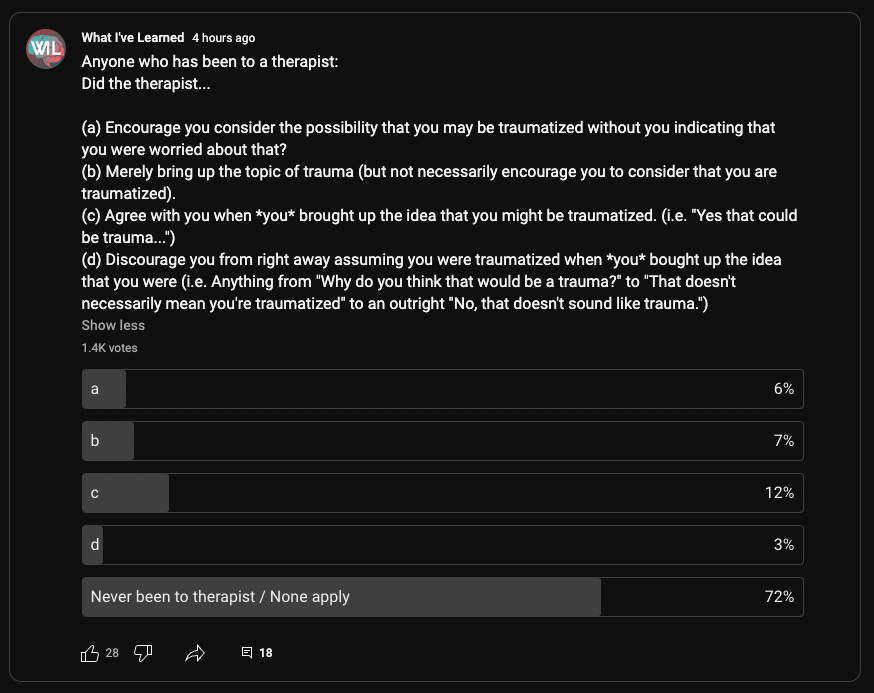 </figure><figure>
</figure><figure>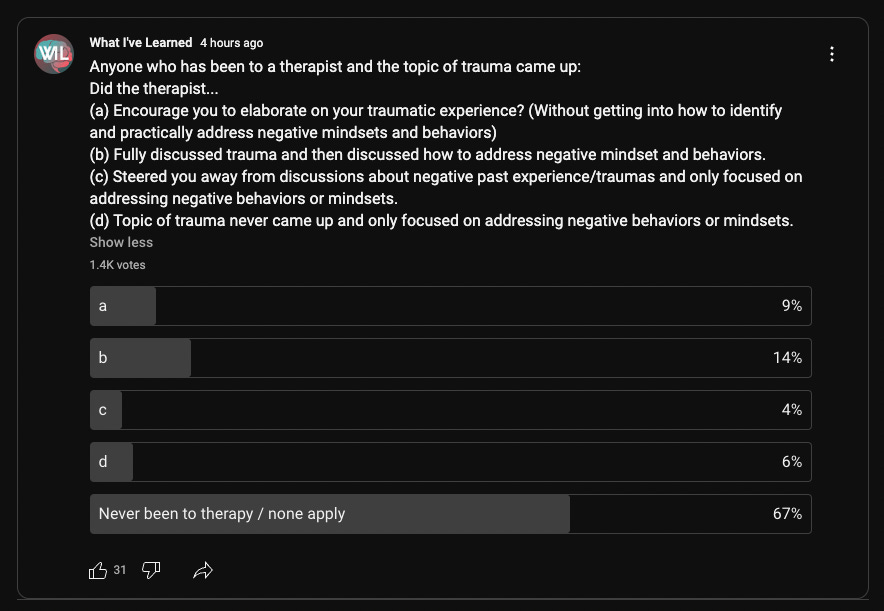 </figure><figure>
</figure><figure>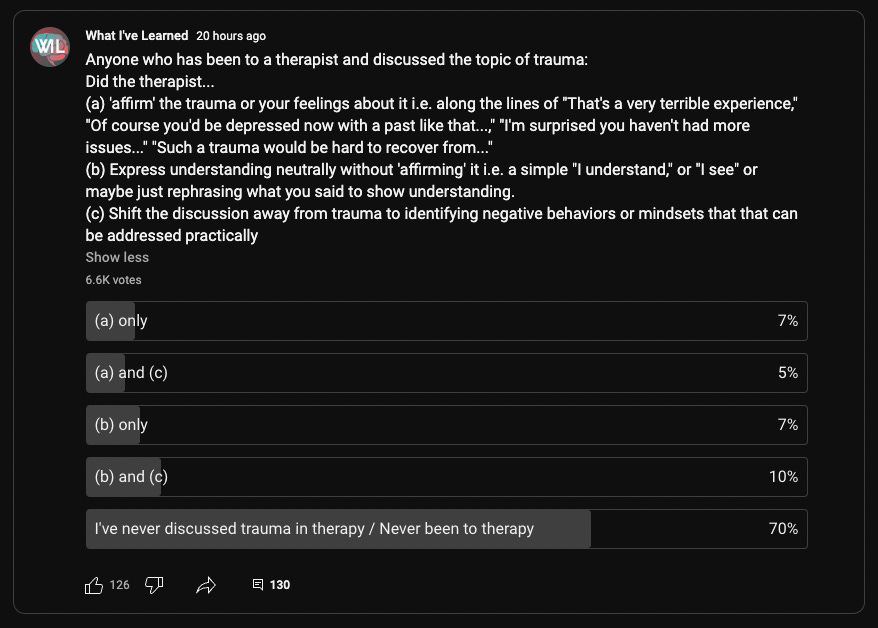 </figure>
</figure>